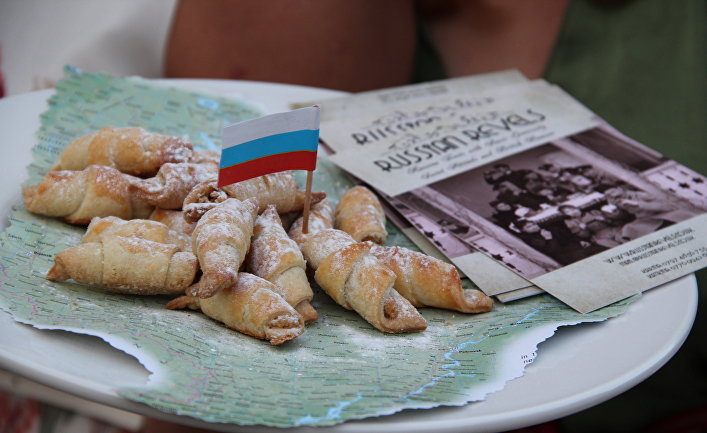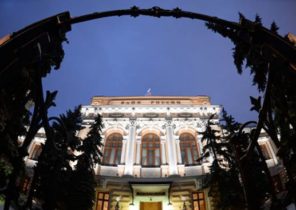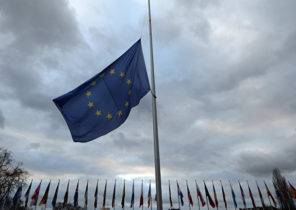
In the shadow of the EU sanctions, Russia opens its food culture. Moscow became the capital of gourmets — on the other side of caviar and glamour of the oligarchs.
Russian people are able to suffer. It survived the Tatar yoke and barbaric times under Stalin. Today, after the huge economic boom that the country has made in the last 20 years and which gave many a Russian their own cars, suffer again, this time in traffic jams. On the way from the airport to the city centre guests can also work out in one of the main Russian virtues — tolerance. Ultimately, the fact that a few hours a day you have to spend for filled with cars urban roads is a commonplace. And you met the owner just shrugs his shoulders at the message on the tube: “Merry Moscow traffic jams!”
Perhaps Muscovites because so quietly tolerate your daily transport chaos, I know that after suffering comes the release. Because many churches, services in which thanks to the new nationalism under Putin, again well worth a visit (by the way, there is also suffering due to lack of seats), in Moscow there are several thousand restaurants for every taste, and every day we open dozens of new. Muscovites eat with the same excesses with which they go on the car. However, the days are numbered for the culinary temples of the oligarchs, where the sounds of harps buckets were eating Beluga caviar and drinking Cristal Roederer. Imposed by Russia sanctions on the import of fruits and vegetables, meat, fish and cheese from the EU and other countries — a reaction to a Western embargo against Russia due to the annexation of Crimea and war in Eastern Ukraine — are now remembered on the traditional cuisine and local high-quality products and develop on this base a new Russian food culture. For Foodies who know London, Paris and new York, a city with twelve million inhabitants, has become the next important address.
To understand what the potential hidden in the new kitchen of Russia, just look at the map of the country. Russia is simultaneously the largest and least developed agricultural nation of the world. As agriculture in the Soviet time was not considered important and accordingly, it was abandoned, the soil is today almost not poisoned by fertiliser. To bio fruits and vegetables from Russia, may someday become an important article of export, as well as meat, fish, seafood and even cheese, are working on them such as chefs, Vladimir Mukhin of “White rabbit”, which is considered currently No. 18 in the list of the San Pellegrino “World’s 50 Best Restaurants”. That the 33-year-old chef in a tasting menu in my outdoor “lab”, something in between a modern kitchen and tasting “table chef” puts on the counter of high quality steel that is both rapid course on learning the Russian commodities: beef, Parfait made from the liver of the Swan coat of marshmallow bun from flour made of birch bark served with butter from Vologda, ribs, braised in a traditional brew of black bread. “I cook from old recipes that bring back memories, but on the latest technologies. And I use exclusively Russian products, — says Mukhin. — Earlier people here went to the restaurants to show off their designer rags. Today they come to eat and they want to eat something new, it needs Russian products”.
Also, the twins Ivan and Sergey Berezutskiy are the pioneers of the new Russian cuisine. Both before sanctions were prepared with a focus on local cuisine, although this concept in Russia can be interpreted very widely. Some products such as king crab from Kamchatka or hair crabs from Gelendzhik will travel to Moscow two times longer than fish from Europe. As logistics in Russia is still behind due to bureaucratic red-tape, the 30-year-old to take four times a year at your own risk goes in search of interesting new products for their Twins. In the open two years ago, the cozy restaurant on the Moscow Patriarch’s ponds, in the fashionable quarter, with many architectural and design companies and, accordingly, open public, they can enjoy the results of their expeditions. The algae that is on the market in Murmansk are only part of what we would have to pay for them in Japan. Or dried goose meat from Bashkiria that brothers delivers one grandmother. “In Moscow it is nowhere, but it’s delicious in the same way as Parma ham,” says Sergei Berezutsky. In Twins and they use it as a spicy addition to pumpkin ravioli.
The fact that in Moscow restaurants because of the sanctions, starting in 2014, no first-class beef from Nebraska or juicy steaks from Argentine beef, for many Moscow restaurants it was a real problem. In the end, a thick piece of precious meat in the Russian society is a macho still has a value of sort object of culinary prestige. Alexander Rapoport, a former lawyer with wall Street, and now one of Moscow’s most famous delis, in the beginning of this year took the market and this niche. The restaurant “Voronezh”, named after a Russian provincial town, the menu has only Russian meat. On the ground floor of the Moscow gourmets buy for stylish counter pervoklassnye clipping, then serves burgers, everything is made in Voronezh. There is one of two masobe in Russia, which for some time constantly supplying good quality products and is also a new phenomenon. “Today people want to eat good products, so they believe in local products,” says Rapoport. Herring from the Siberian rivers SOS’va, he said, has a much more intense flavor than caviar. “In the new Russian food culture, it is not about patriotism, but about the fact that many simple, local products better.”
Vladimir Putin supports the growing interest in local food and Russian cuisine for economic reasons, and also because he was confident how much you can bring in identity with its own food culture. Therefore, among the many new food producers in Russia, a lot of patriots and supporters of Putin. Manufacturer of cheeses Natalia Shumakova this relationship is quite obvious. A speech therapist by profession, she 10 years ago with her husband moved to the village of Polenovo, a favorite vacation spot in the Tula region, 120 kilometers South of Moscow. Here she gave birth to five children. A year ago, she started making cheese, her ten dairy cows are the barn in the garden and next to the sauna is a mini-cheese factory. The walls in her built in traditional Russian style solid wood residential house is decorated with icons and photos of local Orthodox priests, Near the fireplace hangs a painting of Tsar Nicholas II.
Very close to Sofia Shatrova fulfilled their dream of rural life. Former employee Investmentbank have a whole year to grow around your garden Collard and supplies its Moscow restaurants and bio-cooperatives “Lakalaka”, through which sells its cheeses — cheddar, Mozzarella and halloumi and Natalia Shumakova. The creators of the cooperative was the first who started to work systematically with farmers and local food producers. In Moscow they have opened several stores. The eponymous restaurant, which serves exclusively from the products of the cooperative, local foodies are well known.
Businessman Alexander Goncharov for some time joined the cooperative. He believes not only in sense but also in the economic potential of good food and “Farm to table” in Russia. Called “Mark & Lew”, he opened two restaurants with refined cuisine according to recipes of the 19th century, which uses exclusively the products of farms of the Moscow region. Next spring will open a large market right next to the motorway between Moscow and Tula, too, on the initiative of Mark & Lew and “Lakalaka”. “The market for organic food in Russia is still in its infancy, — says Goncharov. But gastronomy in Russia is booming. This year we have a turnover of three times more than in 2015”.
To conclude from this that Russia suffered more than anywhere else, it would seem an exaggeration. And yet no one so intensely and so accurately did not describe the deep connection between food and pain, as the Russian authors of the 19th century, the protagonists of the new Russian cuisine, again, is an example. In “Anna Karenina” by Leo Tolstoy Swinger Prince Stepan Arkadyevich during a sumptuous lunch with my lovey-dovey friend unfortunately Levin put it very precisely: “this is the essence of civilization is to do the pleasure”.







